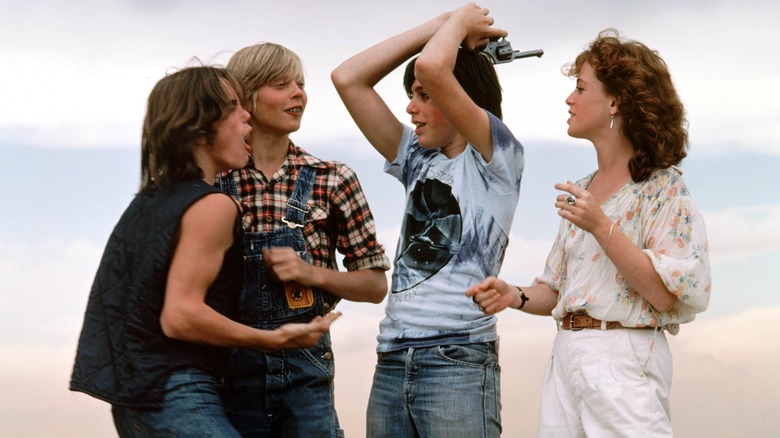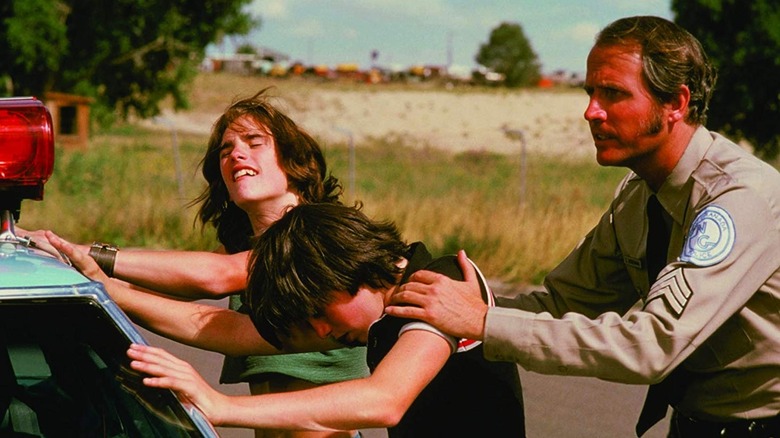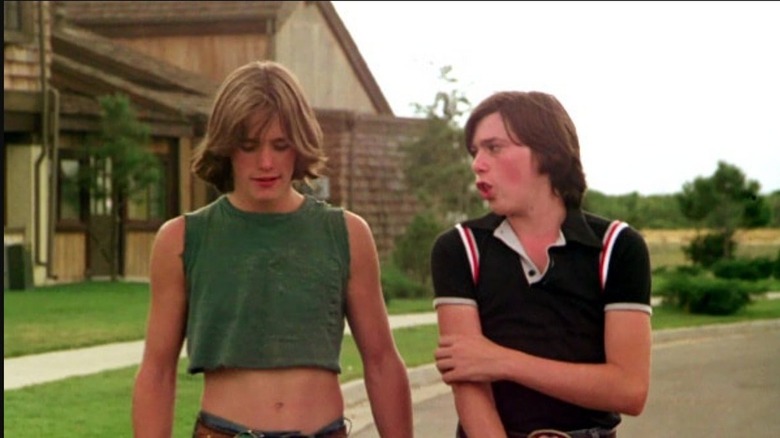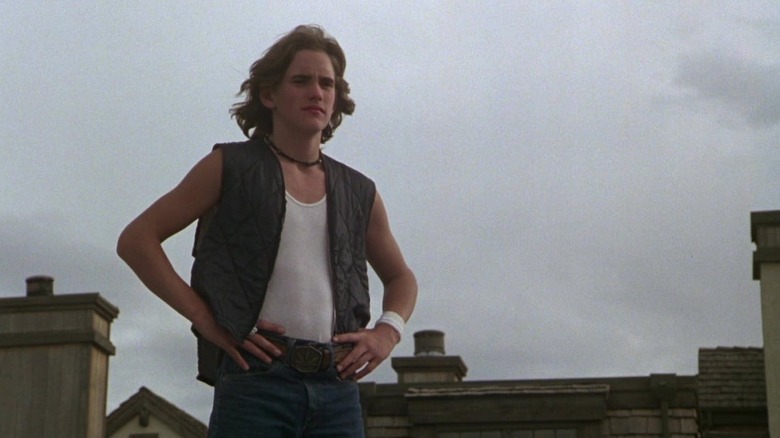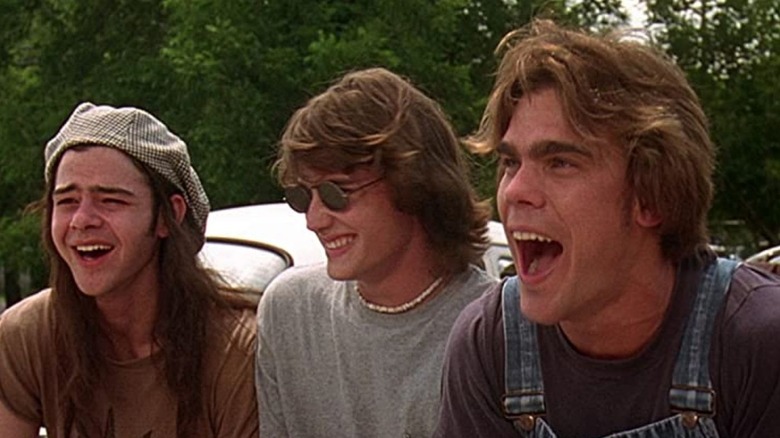How Matt Dillon's First Movie Inspired Both Richard Linklater And Kurt Cobain
Most actors would rather forget their first movies, whether due to the type of film they appeared in or their work within them. Yet, some have the good fortune to not only give an excellent performance the first time out of the gate, but deliver it inside a movie that becomes enormously influential to future legendary artists.
That's precisely the case for Matt Dillon and the first film he starred in, 1979's "Over the Edge." The movie, which sees Dillon as one of the disaffected and mistreated teen residents of a corporate-minded planned community named New Grenada, would go on to inspire the likes of Nirvana's Kurt Cobain and "Dazed and Confused's" Richard Linklater.
Although the film is excellent and has quite the pedigree, it reached such notable fans in spite of a botched theatrical release, with the marketing arm of distributor Orion Pictures putting together an ad campaign that made the gritty teen drama seem like a horror movie. The suits had their reasons for it, but chief amongst them is the fact that "Over the Edge" contains potent themes of protest and revolution, themes that allowed it to inspire such future famous artists as well as remain relevant to this day.
Dillon becomes one of the 'Mousepacks' kids
"Over the Edge" began with a story literally ripped from the headlines. As co-screenwriter Charles Haas recalled in Vice's oral history of the film from 2009, he and co-writer Tim Hunter were drawn to an article in the San Francisco Examiner entitled "Mousepacks: Kids on a Crime Spree." Haas remembered that "it was a sort of sensational piece, and was about young kids who were vandalizing property in Foster City, which was a planned community not too far from the San Francisco Airport." With Foster City featuring "the highest percentage of juvenile crime of any comparable city in the country," as Hunter explained, the two writers saw the potential for a movie, and completed a script entitled "Mousepacks" which they then brought to producer George Litto.
After Litto brought the script to director Jonathan Kaplan, the filmmaker insisted on casting real teenagers as the leads, and sent talent scouts out to various schools in New York state. As one of those scouts, Jane Bernstein, recalled, she was instructed "to look for the new James Dean," and happened to spot one kid in a school in Westchester who surprisingly fit the brief, someone "soft and young but who had a toughness about him."
"He was skipping class, just wandering the hallways. He had this chipped tooth, and he was presenting himself as a tough guy from the wrong side of the tracks. Which was ridiculous ... It was clear from the very beginning that Matt was trying his hardest to play the role of a tough guy."
Despite his total lack of experience and training, Dillon's affected punk attitude and natural instincts won him the role of Richie White, the tough and troubled best friend of the film's lead, Carl Willat (played by Michael Kramer).
Dillon learns how to be a film actor on set
Kaplan ran the "Over the Edge" set as part professional production, part unofficial film school — the better to benefit the largely amateur cast of young actors. For young Dillon, mere acting seemed too false; as he later recalled,
"I wanted to do everything real. So Jonathan would call me Marlon — as in Marlon Brando. I was a Method actor, and I didn't even know what that meant. And I didn't even know who Marlon Brando was, truthfully."
To handle the group of teen performers, Kaplan admitted "I had to invent ways of directing that weren't by-the-book." To solve the problem of Dillon continually looking in the wrong direction during a take (thanks to the teen rightfully claiming he was looking in the correct direction even though his eyeline was wrong for camera), Kaplan would affix a $20 bill to his forehead, and say "'Matt, if you look at this $20 bill, it's yours when the shot is finished.' Over the course of the movie he made about $200."
'On the Edge' becomes 'Over the Edge,' a ... horror movie?
During principal photography, the film had changed titles from "Mousepacks" to "On the Edge," in partial homage to Bruce Springsteen's album "Darkness on the Edge of Town." However, once Orion execs saw the finished cut of the film, which ends with the teens of New Grenada locking their parents and other authority figures inside the high school while they trash the parking lot, the title was changed to "Over the Edge."
Orion was wary of giving "Over the Edge" a big theatrical release due to some then-recent incidents surrounding the release of several "gang" themed movies: Paramount's "The Warriors" and Warner Brother's "Boulevard Nights." As this New York Times article from April of '79 states, Universal's movie "Walk Proud" was delayed due to gang-related violence in a couple movie theaters in California.
Orion's solution was to not only give "Over the Edge" a muted release, but also conduct an ad campaign that would make the film appear to be a totally different genre. Kaplan was appalled that the film's official poster "looked like something for 'Children of the Damned'" while Dillon was confused as to why the commercials "looked like an ad for a teenage zombie movie," as these TV spots show. The young actor was heartbroken and frustrated at the fact that "we all made a great film, and it was just buried."
'Over the Edge's' teen spirit perseveres
Although "Over the Edge" was virtually discarded by the studio in 1979, the film found a resurgence thanks to Joseph Papp's Public Theatre in NYC (which showed the movie as part of its film program in 1981) and the advent of HBO, which put the film into heavy rotation. That's how people like Cobain, Linklater, and other famous fans got to see it and be inspired by it.
Cobain wrote about "Over the Edge" in his personal journals (which were later published in 2002), talked about it in interviews, and even attempted to turn the music video for "Smells Like Teen Spirit" into an homage to the film. Linklater stated that "'Over the Edge' influenced 'Dazed and Confused,' especially along the lines of its honest depiction of the teens themselves," calling Kaplan's movie "a perfect mix of all the conformity and boredom that goes along with [the suburbs] and the natural restlessness, anger, and antagonisms of the teenage years."
The film had farther reaching influences as well, with people like Cameron Crowe praising its soundtrack filled with rock n'roll needle drops and Hunter observing that the movie "influenced the Steven Spielberg notion of setting films in these kind of new, man-made suburbs" — "E.T." and "Poltergeist" in particular.
In addition to Dillon's impressive acting resume, the careers of Kaplan, Haas, and Hunter went on to further notable heights, with movies like "The Accused," "Gremlins 2: The New Batch" and "River's Edge" between them. As for "Over the Edge," its continuing influence against the odds of a botched theatrical release, inappropriate ad campaign and under-the-radar cult status speaks not just to it being a great film but one whose message has persevered: the kids aren't alright, they deserve to be seen, and they deserve to be listened to.
